Late in his life, after retiring the presidency, James Monroe drafted his own history. He was still struck, five decades after the War for Independence, by the “high character of that epoch and of those in whose hands its destiny fell.” He looked back and saw that war as “a school of practical instruction . . . in the knowledge of mankind, in the science of government, and what is of still greater importance, for inculcating on the youthful mind the sound moral and political principles on which the success of our system depends.”[1] This was a pretty standard assessment from the elders of that generation as they looked back over their era. We know Monroe’s wartime service launched his political career and his life’s work as a statesman. But the mechanics across these uncertain wartime moments deserve closer attention: what was this Virginia teenager thinking, feeling, and choosing? Rather than see his war in mind of the man who would become Thomas Jefferson’s ally and who would serve as a senator, ambassador, governor, and president, what does Monroe’s revolution look like when we see him as “a mere youth,”[2] which is how he later described himself? Examining Monroe’s correspondence and his autobiography reveals this young Virginia gentleman building relationships with patrons, seeking distinction among his peers, and making choices to advance himself on his path towards manly independence in the middle of a war for national independence.
Considering James Monroe as a youth reveals the process of political and military mobilization in the American Revolution. Benjamin Franklin notwithstanding, the “Founding Fathers” were not old men. In 1776, Alexander Hamilton was twenty-one, Thomas Jefferson thirty-three, George Washington forty-four. More significantly, half the American population was younger than sixteen; during the long war, military labor would have to be drawn from this youthful pool. James Monroe was born in 1758 into a propertied but unremarkable Virginia family. He only knew a British empire in turmoil. When James was seven, his father, Spence, protested the Stamp Act, along with practically everyone else. But Spence died young in 1774, leaving James and his siblings under the direction of their politically connected maternal uncle, Joseph Jones. Sixteen-year-old James was sent down to college at William and Mary. Finding himself in the political center of Virginia while that community mobilized to resist Parliament’s impositions, young James Monroe began training and drilling with a politicized militia. What did all this look like from this teenager’s perspective? His actions speak loudly. Those militia drills answered the call for political action and Monroe’s need for fraternity in a new place and community. These connections persisted. When the fighting began in 1775, Williamsburg patriots organized a raid on Governor Dunmore’s palace to seize weapons. Monroe participated, apparently the youngest in this heist crew, which carried off 300 swords and 200 muskets. He volunteered, serving under the direction of more established leaders. Getting on six feet tall, shoulders broadening, and thoroughly expendable, Monroe was useful muscle. This escapade suggests two things: Monroe was both visible to his elders in the movement and he was eager to offer his assistance to them.[3]
Patriotic enthusiasm in 1775 demanded action, and Monroe’s social station pointed him towards military service as an officer. He recalled in his autobiography that he continued to pursue his studies at college until January 1776 when he said it was “essentially shut up by the procession of the war.” Along with his college roommate John Francis Mercer (“and,” he wrote, “several other youths of great merit”), Monroe volunteered as a cadet in the 3rd Virginia Regiment in the expanded Continental Army. Gentlemen cadets were essentially unpaid interns—potentially too young to be granted an officer’s commission, but with the social status and family connections to be worthy of instruction and audition. Monroe passed muster: he was soon after “appointed a Lieutenant.”[4] An officer’s commission relied on and ratified social rank—an officer was a gentleman. Stepping forward to defend his country satisfied multiple demands: he displayed his patriotic resolve while grabbing a rung on the ladder of Virginia’s hierarchy. To be a gentleman in Virginia was to be seen and judged. With the college closed and his family property held in trust by his uncle, what else was teenaged Monroe going to do to advance himself?
Patriotism was not incompatible with personal drive; a Massachusetts lieutenant captured at Bunker Hill explained his motives: “When this Rebellion came on, I saw some . . . Neighbors get into Commission who were no better than myself. I was very ambitious, and did not like to see those men above me . . . I offered to enlist upon having a lieutenant’s commission . . . I imagined myself now in a way of Promotion: If I was killed in Battle, there would be an end of me, but if my Captain was killed, I should rise in rank, and should still have a chance to rise higher.”[5] Young men across the continent knew the war could advance their prospects.
Revolutionary soldiers and junior officers were young men; on average, Virginia’s continental soldiers were between twenty and twenty-one years old at enlistment.[6] Paul Fussell, a literary critic and World War II veteran, rather cynically remarked that “War must rely on the young, for only they have the two things fighting requires: physical stamina and innocence about their own mortality.”[7] The rage militiaire of 1775 points out a third component at play in the Revolution: messianic political enthusiasm. Nobody believes likes a true-believing teenager—this appears to have been the case for James Monroe.
If Monroe was naïve about what war was, the battles of 1776 quickly disabused him. The 3rd Virginia Regiment marched to New York as the campaign exploded. A British fleet disgorged thousands of professional British and Hessian soldiers; at Brooklyn, Monroe remembered, the elite Maryland and Delaware regiments were “cut to pieces.” It was blind luck that Monroe’s regiment had not completed its march north sooner and met the same fate. On Manhattan, Monroe heard the news that the Connecticut militia broke and ran from the British at Kips Bay. The next day, the Virginians held at Harlem, “fighting gallantly” to check the British advance. Monroe saw his officers killed in this engagement. He then retreated with Washington’s army to White Plains and stood with the rear guard at Newark, counting only 3,000 soldiers pass. Of this desperate moment, Monroe recalled seeing George Washington: “at the head of a small band, or rather, in its rear, for he was always near the enemy, and his countenance and manner made an impression on me that time can never efface.” Peering back through a hazy patina laid down by decades, Monroe insisted, “A deportment so firm, so dignified, so exalted, but yet so modest and composed, I have never seen in any other person.”[8] It must have been a bright spot for the young lieutenant in this dark moment of the war.
It is striking that Lieutenant Monroe volunteered to go with the vanguard unit in the Christmas surprise attack on Trenton. Was it patriotism? Ambition? Both? It is telling that he put himself forward to serve under a fellow Virginian, Capt. William Washington. His Continental service was still entwined with his home state, the men he knew, and those local relationships. With fifty men, that company cut off communications to Trenton, then led in attacking the Hessian picket, shooting down their commander and taking the cannons that would have ended the war had they been brought to bear. When his captain was shot, command devolved onto Monroe; he did his duty, advancing “at the head of the corps” and then was shot in turn, falling with a severe shoulder wound. He had proved himself diligent and brave during a desperately hopeless campaign. Promoted to captain in recognition of his service, Monroe had seen and felt the costs of war. He was only eighteen years old.[9]
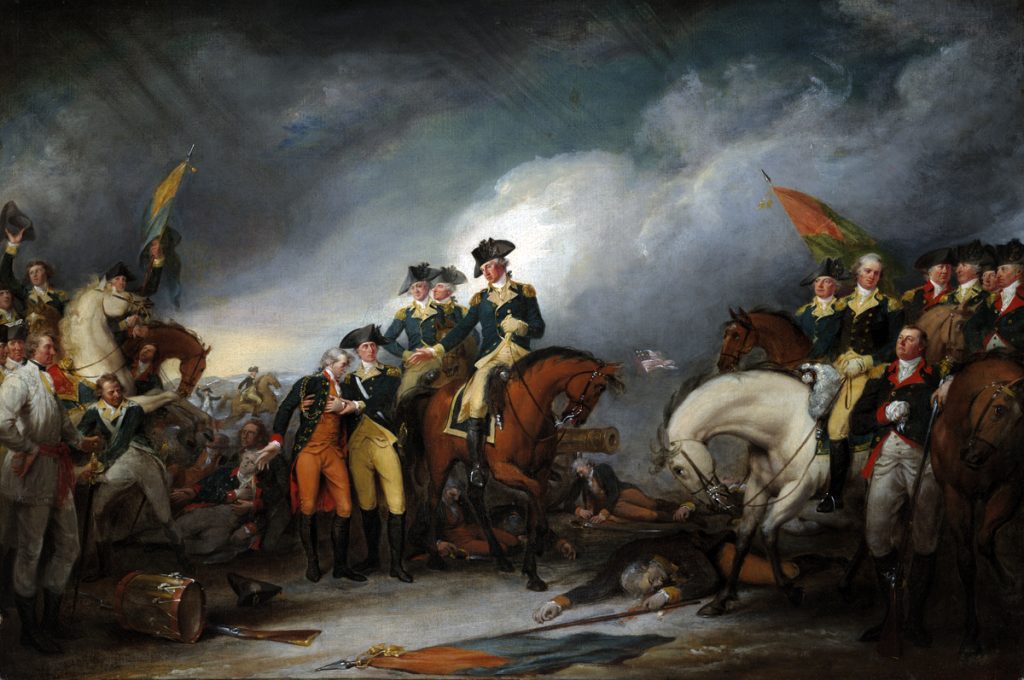
With this recognition and promotion, the meaning of the war shifted for Captain Monroe, presenting new possibilities and challenges. His first task in 1777 was recruiting soldiers for the company he would command. It did not go well. He complained to his first captain that “fortune” had not thrown “more than six men, who are willing to enter into the army” in his path. He boldly wrote that he preferred the “fatigue and danger” of active service to recruiting. Young Monroe clearly cared what people thought of him: “There seems to be too generally annexed to the character [of recruiters] the Idea of Insignificancy and indolence.”[10] Without men to command, Monroe could have found himself idled at home at this point. Indeed, this had befallen the officer to whom he was writing. But Monroe got lucky: Gen. William Alexander, Lord Stirling, knew Monroe from the New York campaign and invited him to join his staff as an aide-de-camp. Eighteenth-century army staff were termed a general’s “family”—with the implications of the young officers’ dependence on their elders and the reciprocal patronage to be provided by the commander. By the end of August, Monroe could write to his first captain, “I live very agreeably with Lord Stirling.” The rest of that letter is also telling—Monroe reported the units potentially in need of officers, but gently dissuaded his former captain from coming to headquarters in search of a position; there was already much competition for assignments.[11] Young Monroe the aide had become a conduit to the powerful. This partly made up for an aide’s secretarial and dependent status. His responsibility, he later wrote, was “to bear the orders of his general to the troops . . . and when in camp, or on the march, to take those of the commander-in-chief . . . and report them to his own general.”[12] In the field, an aide spoke with the voice and authority of his general; but as exciting as that might be for a nineteen year old officer, he wasn’t issuing his own commands or holding his own authority. Monroe spent the campaigns of 1777 and 1778 serving the internal bureaucracy of the army and the household of General Stirling.
Monroe recalled that his service as Stirling’s aide provided an unparalleled education. “Possessing the confidence of his general,” Monroe wrote of himself in the third person, “he knew all the springs of action and the principles on which every movement turned.” He “became acquainted with all the general officers of the army, with their aides, and with other officers in that circle . . . Their society gave him lessons of practical instruction.”[13]This service brought a new perspective, too. Like many other Continental officers, he perceived the Revolution from within its only national institution (apart from the Congress): “the members who composed it came from all the states” and he noted its “tendency . . . to break down local prejudices and attach the mind and feeling to the union.”[14] Of course, he also saw these officers wrangle over rank and seniority and duel each other over perceived slights to their honor. And he counted the continued bill of wounds and death delivered to friends old and new; action at Brandywine wounded both his old college roommate John Francis Mercer and his new acquaintance, the nineteen year old Marquis de Lafayette. “Many others . . . personal friends” of his old regiment, Monroe recalled, “were wounded and some of them killed in that action.”[15]In his memoir Monroe repeatedly returned to the danger and costs of the war imposed on the other young men around him.
These officers were young, ambitious men, and the course of their war was neither smooth nor predictable. By the summer of 1778, the French alliance, near-victory at Monmouth, and the stalemate between British and Continental forces in the north made it appear that winning American independence was only a matter of time. That it would take four more years would have shocked them. At this point, in 1778, many Continentals started looking toward getting up or getting out. Officer resignations accelerated again in late 1778; the private soldiers’ of 1777 followed them, ending their three year enlistments at the end of 1779. They had to get on with their lives; it was time for others to take their place in the line. Monroe also appeared to be seeking advancement and his independence at this point in the war. In fall 1778, Monroe exchanged a fascinating set of letters with Theodosia Prevost—a New Jersey patriot who, despite her marriage to a British officer, had offered her home to General Washington as a headquarters site.
Monroe’s surviving letters to Prevost reveal two things about this moment in later 1778: first, he was planning to travel to France, both to continue his studies and to participate in the diplomatic mission; he was contemplating a career shift. Second, he had convinced an unnamed young lady that she should consent to endure their temporary separation during this mission.[16] Monroe had likely met her in Theodosia Prevost’s social circle, in which she brought together young officers and eligible young ladies. James McHenry, one of Washington’s aides, recalled how officers “talked and walked and laughed and frolicked and gallanted” at her home, the Hermitage.[17] It is plausible Monroe was looking at a possible marriage match with this young woman—certainly elite—which would have had significant economic implications for him and his independence in the form of her likely dowry. Her consent—and her family’s—to his plan for education abroad was necessary. This could lay a path leading away from the dependence that marked the role of an aide-de-camp. (Lest this marriage plot sound odd, it was exactly the path that Alexander Hamilton took in 1780, marrying Elizabeth Schuyler, linking himself to her politically powerful father, and then resigning from Washington’s staff in a huff within two months’ time.) In 1778, Monroe was figuring out how to keep climbing—in the army or out of it.
In his autobiography, Monroe explained his plans at this point: “Having entered the army with an enthusiastic zeal in support of our cause in his eighteenth year, he was anxious to pursue the same career until it should be accomplished. His object was now to obtain a command in the army.” Monroe, like all aides, wanted a regiment of his own. Yet, “no commission could be granted to him, for no new regiments were to be raised and many officers of merit were deranged in consequence.”[18] Here Monroe got creative: he resigned from Stirling’s staff in December 1778 and returned to Virginia hoping to obtain a command in that state’s internal forces. This proved ineffective. So Monroe hurried back north to headquarters in spring 1779. While there, he must have spoken with fellow aide Alexander Hamilton about his circumstances and ambitions. Hamilton thus wrote to John Laurens: “Monroe . . . proposes to go in quest of adventures to the Southward. He seems to be as much of a knight errant as your worship; but as he is an honest fellow, I shall be glad he may find some employment, that will enable him to be knocked in the head in an honorable way.” Hamilton recommended Monroe for Laurens’s plan to raise a battalion of freed black soldiers. “He will relish your black scheme if anything handsome can be done for him in that line. You know him to be a man of honor, a sensible man, and a soldier . . . You love your country . . . and he has the zeal and capacity to serve it.”[19] While nothing came of Hamilton’s recommendation, Monroe also secured letters from Washington and Stirling. Those recommendations did their work; the Virginia assembly granted Monroe a lieutenant colonelcy in the state line—but his recruiting efforts failed again, despite the British incursion into Georgia, and he “was in consequence thrown out of the service.”[20]
Young Monroe was certainly patriotic. He sought a Virginia commission, he explained in 1779, “from my attachment to the service and desire, as I began almost with the war, to serve to the end of it.”[21] But his effort to take the field with a command had failed. His dilemma at this point was that he was underage and “found it difficult to make such disposition of my property.” His uncle still controlled his father’s estate and Monroe was reduced to living under his uncle’s roof. He apologized to Charles Lee: “If it was my house, my dear general, you should make it yours.”[22] His only path to independence was continued military service. He framed it bluntly in his autobiography: he was “too young for civil employment.”[23] By the fall, he lamented how Virginians were “neglecting the cause in which our Country is engaged.” The war “makes no further impression on them than a narrative of events which might have happened in ancient Greece or Rome.” While he read in the college library, he groused that his countrymen had “read and philosophized till they have philosophized themselves out of all feelings of the heart.” “The perpetual freedom and Independence of an extensive Continent is at stake.”[24] His manly independence, his career, his identity were also at stake—all of which had been bound up with his character as an officer—and in a cause, he wrote, “in defense of which he had already made such exertions, and . . . nearly fallen a victim.”[25]
It appears circumstances under which Monroe left the army amplified this moment of transition and personal crisis. All his plans and maneuvers for climbing in the army had failed. There may also have been complications at home. One of Monroe’s biographers believes his uncle and key patron, Joseph Jones, unexpectedly fathered a son in 1779.[26] This new heir promised to displace Monroe from property and his family patron’s focus, likely at the moment when his military career appeared at an end.
Dealing with all this uncertainty, by spring 1780 Monroe was completing his studies at William and Mary and preparing to read for the law, pursuing his uncle’s plan for him from before the war. (Monroe’s older friend Gen. Charles Lee lamented legal petty wrangling over real estate as “a most horrid narrower of the mind.”)[27] But Monroe’s long experience at headquarters helped direct a crucial decision—should he study with George Wythe, the preeminent legal mind in Virginia, or with Thomas Jefferson, the governor? He chose the governor. His uncle concurred with the logic of standing close to powerful men; if there was a campaign against the British, Jones hoped Jefferson would lead the state militia himself. “You, no doubt,” Jones instructed Monroe, “will be ready cheerfully to give him your Company and assistance” in any campaign.[28]Young Colonel Monroe could go back to being an aide.
Jones’ expectations were correct. Governor Jefferson, in between assigning Monroe legal reading lists, also wrote that he had “occasion, to employ a gentleman in a confidential business, requiring great discretion, and some acquaintance with military things.”[29] The British had captured Charleston in May 1780. To protect Virginia, Jefferson needed intelligence and renewed communication with the scattered patriot forces. He tasked Monroe: “observe the British army and communicate their movements” and report the “resources of our friends, their force, the disposition of the people, the prospects of provisions, ammunition, arms.” Jefferson instructed Monroe to tell governors and generals “that [they] may through you be enabled to correspond with me.”[30] Monroe was back in his military element. Being cut adrift from the Continental army and his patrons there, as well as his potentially changed relationship with Jones, Monroe said, had “perplexed my plan of life.” After the mission, he thanked Jefferson; without his patronage “I should most certainly have retired from society with a resolution never to have entered on the stage again.” “My plan of life is now fixed.”[31]
That was an easy thing for Monroe to write in a thank you note. But the war continued. The British landed at Norfolk, Virginia in fall 1780. Monroe received command of a militia regiment—likely at his suggestion, his old friend John Francis Mercer “was appointed with him” as his second in command.[32] They were only out for a month. When the British returned in greater force in 1781, Virginia’s weak mobilization meant Continental forces led by Lafayette were necessary to check the invaders in the tidewater. Monroe’s attempt to secure “some command in the militia” from the new governor was unsuccessful. Virginia had plenty of officers; she lacked soldiers.[33] “I could not stay at home in the present state of the country and should be happy to bear some part in her defense,” explained Monroe to Jefferson. “For that purpose, I sat out to join the Marquis’s army to act in any line either himself or Council would employ me in.” He hoped to “join the army and serve till the enemy leave this state.”[34] It wasn’t to be. At the siege of Yorktown, Monroe again applied to his friend Lafayette, asking if he would “mention me to your friend General Lincoln.” “My wish is merely to make my continuance temporary during the operations here, to . . . render some little service to the General and if possible to my state and at the same time enjoy the society of some excellent citizens from whom my particular circumstances alone have . . . reluctantly separated me.”[35] He wasn’t asking for a permanent appointment, just a continued chance to serve—and to perform. It never came. But Monroe had another iron in the fire. He had returned to planning a trip to France for study and diplomatic connections. During the Yorktown siege itself, Monroe told Jefferson he hoped to sail in November; he was still waiting on a France-bound ship in May 1782.[36]

Monroe’s war had been marked by diligence and bravery, yes, but also by a subordination and dependence that echoed his relationships with his civilian patrons, Jones and Jefferson. His curmudgeon-y friend, Charles Lee, had long lamented Monroe’s bashful demeanor, his submissive false modesty[37]—Lee had a disordered personality and consequently did not understand the stance his young friend took in interacting with superiors. But Monroe himself was looking forward and was ready to shake this off. Would his French scheme safely cut those cords with patrons and allow Monroe to stand independent, his own man, at last? That ship never sailed. Instead, he followed the instructions of Jones, standing for election in the House of Delegates in order to burnish his legal credentials and elite Virginia contacts. Washington’s and Stirling’s old letters of recommendation again helped him—without the letters, Monroe thanked them, “I could not have expected . . . to have obtained this degree the confidence of my Countrymen.”[38] His fellow legislators in short order put Monroe on the executive council—before he had been admitted to the bar—likely because he had little private business to distract from the drudge work of governance. Echoes of the duties of aide-de-camp? When term-limits removed Jones from the Congress in 1783, the legislature sent Monroe up to keep his patron’s seat warm. (Again, the parallels with Alexander Hamilton are fascinating –Hamilton got sent to the Congress to fill father-in-law Schuyler’s seat.) Even in elected political office, Monroe was a junior partner in a complex political network and chain of command.[39]
James Monroe arrived at Annapolis in December 1783 as his new Congressional colleagues prepared to ratify the final treaty of peace. Gen. George Washington rode into town a week later and then resigned his commission to the Congress two days before Christmas.[40]
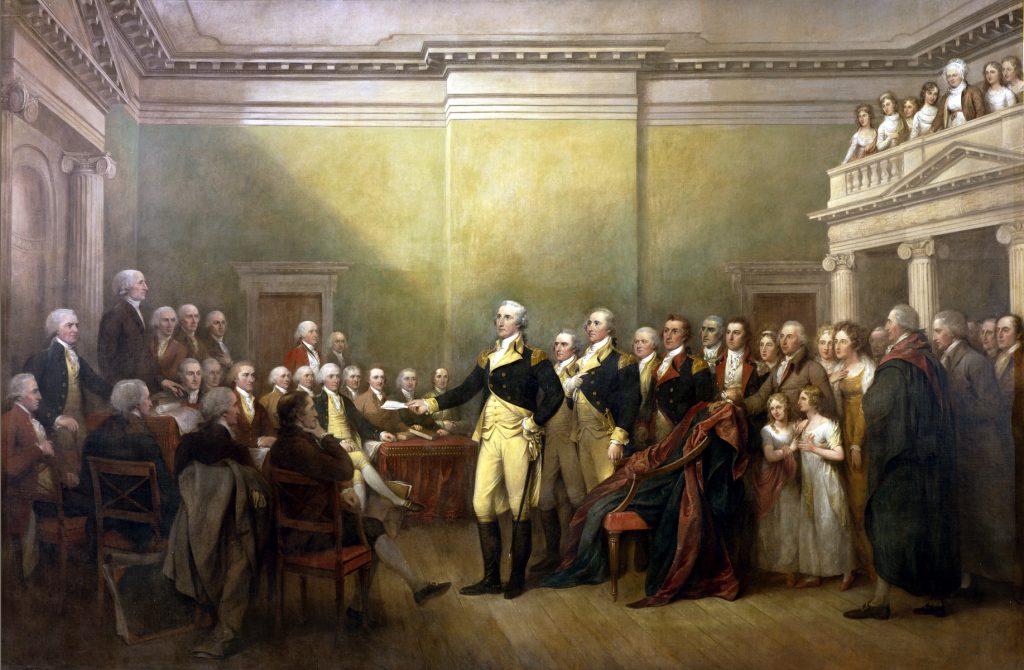
“The scene was highly interesting,” Monroe later wrote with some understatement. He reflected how “he had served as a lieutenant under [Washington] only a few years before.” In his autobiography Monroe drew a straight line from his military service and his elevation to political office: It was “gratifying,” he wrote, “to recollect that his promotion had been the result of the free suffrage of his fellow citizens, founded in part, at least, on the favorable opinion entertained of his conduct in that service.”[41]At the time, however, Monroe’s path as a young officer and member of the rising generation of Virginia’s political elite show the persistenceof hierarchy, patronage, and dependence. Young men like Monroe were embedded in relationship webs that tied them to their elders. David Ramsay’s observation in his 1789 history of the Revolution—“It seemed as if the war not only required but created talents”[42]—certainly applied to the young James Monroe. The war nurtured and drew forth his abilities. To this, however, we should add that even for the elite young men of Revolutionary Virginia, the pursuit of American Independence not only required, but continued their dependence.
[1]James Monroe, Autobiography of James Monroe, ed. Stuart Gerry Brown (Stanford: Stanford University Press, 1959), 26.
[2]Monroe, Autobiography, 3, 26.
[3]Harry Ammon, James Monroe: The Quest for National Identity (New York: McGraw Hill, 1971), 5-7; see also Tim McGrath’s recent biography, James Monroe, a Life (New York: Dutton, 2020).
[5]Peter Oliver, Origin and Progress of the American Rebellion (San Marino: Huntington Library, 1963), 129-30; see also John Shy, A People Numerous and Armed (Ann Arbor: University of Michigan Press, 1990), 168-71.
[6]John R. Sellers, “The Common Soldier in the American Revolution,” in Military History of the American Revolution, edited by Stanley J. Underdal (Colorado Springs: Office of Air Force History, 1976), 156; see also John A. Ruddiman, Becoming Men of Some Consequence: Youth and Military Service in the Revolutionary War (Charlottesville, VA: University of Virginia Press, 2014), 7.
[7]Paul Fussell, Wartime: Understanding and Behavior in the Second World War(New York: Oxford University Press, 1989), 52.
[8]Monroe, Autobiography, 23-24; Ammon, James Monroe, 9.
[9]Monroe, Autobiography, 25-26.
[10]Monroe to John Thornton, July 3, 1777. The Digital Edition of “The Papers of James Monroe” is a documentary editing project at the University of Mary Washington; their “Monroe Catalogue Online” provides access to approximately 38,000 entries detailing his correspondence. All letters referenced in this essay can be readily found in PDF transcription within this excellent digital compilation.
[11]Monroe to Thornton, August 25, 1777.
[12]Monroe, Autobiography, 29.
[16]Monroe to Theodosia Prevost, November 8, 1778; Monroe to Charles Lee, June 13, 1779. Monroe meant to travel to France in fall 1779, writing “I wish to go in the character of an officer.”
[17]Ammon, James Monroe, 25-26.
[18]Monroe, Autobiography, 29.
[19]Hamilton to John Laurens, May 22, 1779, Proceedings of the Massachusetts Historical Society 58 (1924-25), 220; see also Founders Online.
[21]Monroe to [William Woodford], September 1779.
[22]Monroe to Lee, June 13, 1779.
[24]Monroe to [William Woodford], September 1779.
[25]Monroe, Autobiography, 32.
[27]Lee to Monroe, June 25, 1780.
[28]Joseph Jones to Monroe, March 1, 1780.
[29]Thomas Jefferson to Monroe, 10 June 1780.
[30]Jefferson to Monroe, June 16, 1780.
[31]Monroe to Jefferson, September 9, 1780.
[32]Monroe, Autobiography, 32.
[33]Ammon, James Monroe, 33; Monroe to Jefferson, October 1, 1781.
[34]Monroe to Jefferson, June 18, 1781.
[35]Monroe to Lafayette, September 27, 1781.
[36]Monroe to Jefferson, October 1, 1781; Ammon, James Monroe, 34.
[37]Lee to Monroe, July 18, 1780. Lee teasingly referred to Monroe’s “mauvaise honte.”
[38]Monroe to Lord Stirling, September 10, 1782.
[39]Ammon, James Monroe, 35-39.
[42]David Ramsay, The History of the American Revolution, ed. L.H. Cohen (Indianapolis: Liberty Classics, 1990), 2: 631.





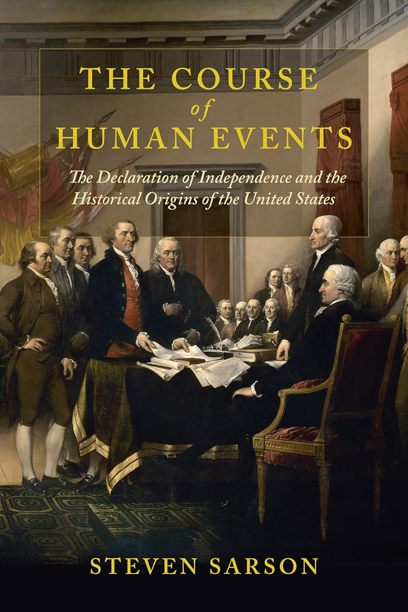
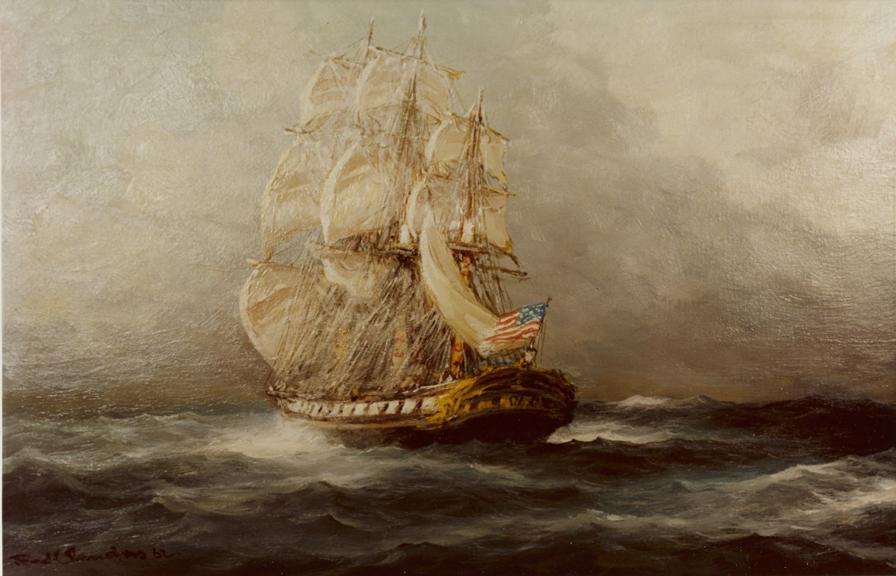
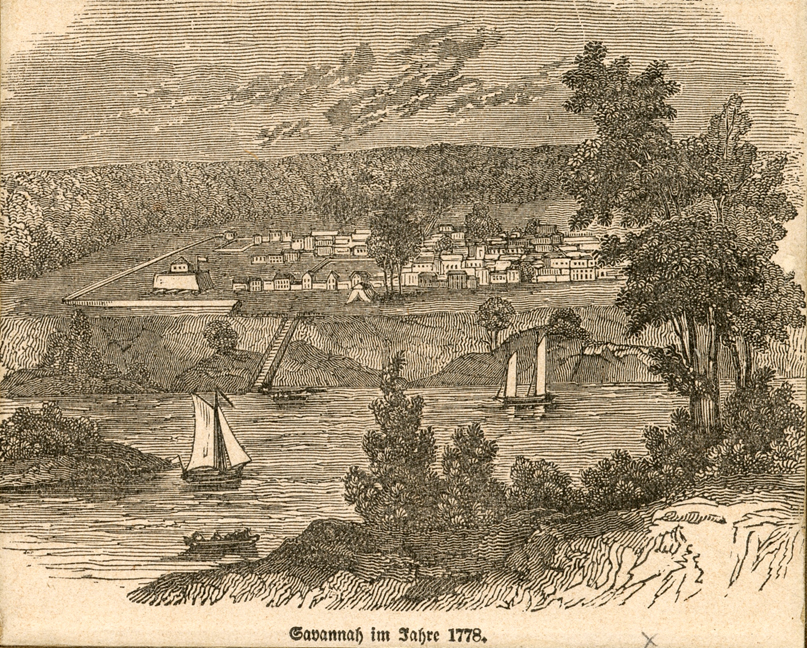

4 Comments
Thanks for a fine article, John. I love the Paul Fussell quote. Interesting to focus on Monroe who was, as he says and you point out, too young for civil service but old enough for the army. In the Annapolis painting, is that Monroe standing in the yellow vest in the lower left?
C McBurney! Monroe appears to be the figure wearing the yellow vest with his leg crossed.
https://en.wikipedia.org/wiki/General_George_Washington_Resigning_His_Commission#/media/File:Gen._Washington_resigning_his_commission_to_congress_at_Annapolis,_M._D.,_December_23rd,_1783_(72751).jpg
Powdered hair! No cult of youth in 1783… or relevance of age for Trumbull in 1820s!
Excellent article!
Despite the support letters from Washington and Stirling, I wonder if Monroe’s relationship with Charles Lee caused Maj. Gen. Benjamin Lincoln to ignore Monroe’s request to join as a volunteer? An association with Lee damaged many careers.
Sharp insight!